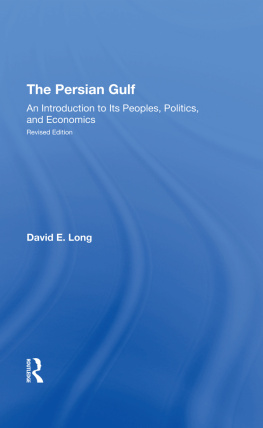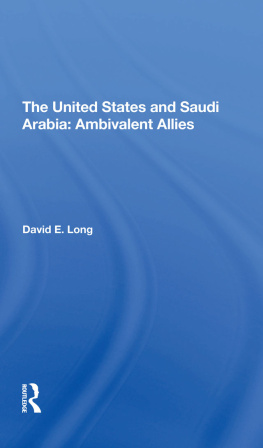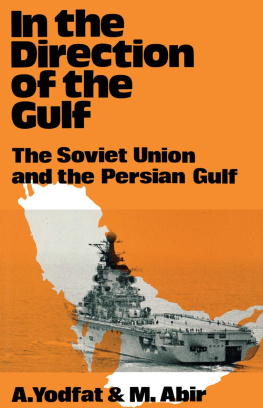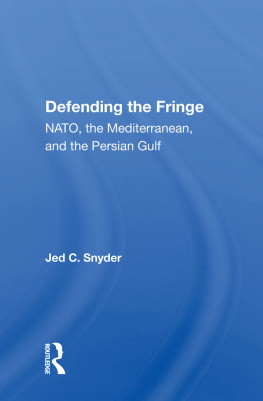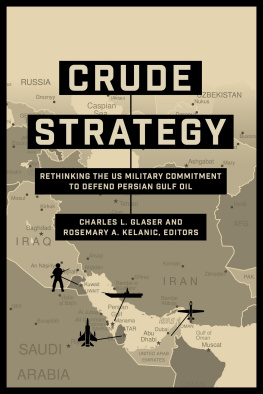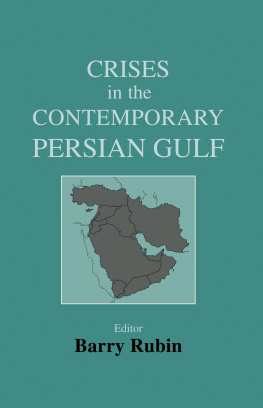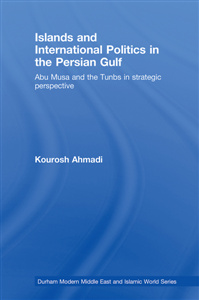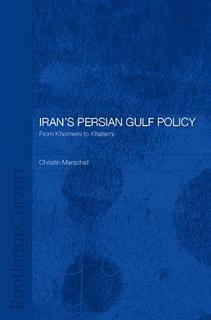The Persian Gulf
Other Titles in This Series
Oil, the Arab-Israel Dispute, and the Industrial World: Horizons of Crisis, edited by J.C. Hurewitz
The Middle East: Critical Choices for the United States, edited by Eugene V. Rostow
Yemen: The Politics of the Yemen Arab Republic, Robert W. Stookey
Westview Special Studies on the Middle East
The Persian Gulf: An Introduction to Its Peoples, Politics, and Economics
David E. Long
Since the energy crisis of 1973, the political, economic, and strategic importance of the Persian Gulf to U.S. interests has become readily apparent. Yet little has been written on the area or on policy considerations toward it. This book, in its second, updated edition, fills a considerable part of the gap in the literature. The first chapter describes the geographical and climatic features of the region, its peoples, and their cultures. Other chapters analyze the dynamics of each of the littoral states; regional gulf politics, centering on the clash of radicalism and conservatism on the one hand and that of Persian and Arab nationalism on the other; the role of the gulf in international politics; gulf oil; and the economics of the region. The final chapter deals with U.S. interests in the area, recent strategic and economic moves, the development of a U.S. gulf policy over the last nine years, and an assessment of that policy in terms of future national needs.
David E. Long, a research analyst with the Department of State, was previously executive director of the Center for Contemporary Arab Studies, Georgetown University. Dr. Long holds an M.A. degree from the Fletcher School of Law and Diplomacy and a Ph.D. from George Washington University. He is currently working with Dr. Bernard Reich on a text on the government and politics of the Middle East.
First published 1976 by Westview Press
Published 2019 by Routledge
52 Vanderbilt Avenue, New York, NY 10017
2 Park Square, Milton Park, Abingdon, Oxon OX14 4RN
Routledge is an imprint of the Taylor & Francis Group, an informa business
Copyright 1976 by Taylor & Francis
All rights reserved. No part of this book may be reprinted or reproduced or utilised in any form or by any electronic, mechanical, or other means, now known or hereafter invented, including photocopying and recording, or in any information storage or retrieval system, without permission in writing from the publishers.
Notice:
Product or corporate names may be trademarks or registered trademarks, and are used only for identification and explanation without intent to infringe.
Library of Congress Cataloging in Publication Data
Long, David E
The Persian Gulf
(Westview special studies on the Middle East)
Bibliography: p.
1. Persian Gulf region. 2. Persian Gulf region-Politics and government. I. Title.
DS326.L654 1978 953.6 77-14059
ISBN 13: 978-0-367-29474-8 (hbk)
To Barbara, Gordon, Geoffrey, and Andrew
Looking back over the year and a half since this book was completed, I find it very difficult to evaluate the lasting significance of the many changes that have taken place. One could make a convincing case that the gulf area has totally changed, but an equally convincing case could be made that all is the same.
There have been no major governmental changes in the region, although several of the gulf rulers are in ill health and changes could occur in the next few years. On the international scene, the Arab-Israeli problem has become a far greater factor in gulf politics than it had been. Economically, the petrodollar has continued to grow in importance. At the same time, the almost hysterical predictions of economic chaos that one heard in 1974 and 1975, resulting from the gulf oil producers accumulation of foreign reserves, have given way to a more realistic appreciation of petro-economics. Thus, looking at the gulf area in the summer of 1977, I would have to say that, on balance, it continues to enjoy a level of tranquility quite singular for the Middle East.
I should like to thank Deborah Miller, David Vance, and Peter Johnson for their help in revising and updating the text.
Burke, Virginia
August 1977
Anyone who attempts a broad survey study is beholden to more people than he can mention. This survey is no exception. That it was done at all was due to the Council on Foreign Relations which provided me an International Affairs Fellowship for 19741975. I should especially like to thank Alton Frye and John Campbell of the council for their support and encouragement. Thanks are also extended to David Abshire and the Georgetown University Center for Strategic and International Studies for so graciously providing me with a place to write and conduct research and for the excellent administrative support during my fellowship year, and to Jon Vondracek of the center for his unflagging support and encouragement. I am indebted to Richard Erb, another International Affairs Fellow and a traveling companion during our research trip to the gulf, for his excellent company and enlightenment on some of the mysteries of petroeconomics. He also provided the economic data in the Appendix. The support and kindness of my Foreign Service colleagues all along the waythe Jack Pattersons in Tehran, who put us up for a night when we had nowhere else to go; the American Embassy staffs in Kuwait, Bahrain, Qatar, UAE, Oman (where Bob Headly also put me up and David Zweifel got me to Dhufar and Nizwa), Saudi Arabia, Lebanon, and Londonall were invaluable. The embassy staffs and government officials of each of the gulf states we visited were more than generous with their time and assistance; I cannot thank them enough. I also wish to thank those of the Arabian Mission of the Reformed Church in America for their kindness and help, particularly Dr. Donald Bosch in Muscat. To Debbie Dawson, Mona Jallad, John Wetter, and particularly Blythe Joneswho suffered through deciphering most of the first draftI gratefully acknowledge my appreciation for the willingness and cheerfulness with which they prepared the manuscript, and to Michael Burrell and Thomas Ricks, who read it in its entirety and offered valuable suggestions, I also say thank you. Finally, I should like to give my humble thanks to my family for bearing with me during the months of research, travel, and writing that went into the book.
Georgetown University
February 1976

1
The Land and People
Geography, in the words of Carlton Coon, is the prince of disciplines, combining the fruits of geology, meteorology, anthropology, sociology, economics, and dozens of other specialties. Nowhere else in the world is there a better example of the impact of geography on society, economics, and politics than the Persian Gulf. Start with geology. The gulf is situated in a sedimentary basin which holds roughly two-thirds of the worlds proven reserves of oil. Without that fact, the gulf would elicit little interest for any but the peoples who inhabit its shores. But because of its oil, in an energy-deficient world, it has become an area of universal importance. Understanding the peoples of the gulf has taken on an urgency never known before. And to understand them, because their societies have been molded by the lands they live in, it is necessary to start with their geography.

